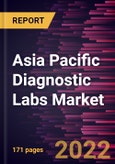The digital transformation in the diagnostics laboratory showed how life science companies use digitalization in research and development or quality control laboratories. The modern laboratory has dramatically changed how tests are performed, and biopharmaceutical products are manufactured. As technology continues to revolutionize, there is an increasing need to provide a modern, quality-driven digital approach to laboratory operations that offers consumers unparalleled convenience, impactful innovation, and reliability. Innovative technologies have made POCT devices portable and also improved sampling techniques, so they are minimally disruptive. This technology's relatively user-friendly nature is mainly due to advances in disposable test cartridges and microprocessor-based analyzers. Several advances are poised to change the industry testing paradigm through speed, quality, efficiency, and scalability to guide patient care.
The healthcare system is increasingly recognizing the value that labs can play by becoming more of a clinical decision-making engine, helping patients conduct tests at home with physicians, interpreting results, and diagnosing and monitoring patients more accurately and faster. The ecosystem to support the growth of Smart Labs is maturing, and several technology start-ups and prominent commercial players are already developing products and solutions targeting the specific areas for pre- and post-analytical surgeries and related areas, including smart procurement and remote monitoring, and predictive maintenance.
Increasing testing volumes, cost pressures, and, in some instances, distributed labs are forcing traditional participants to leverage converging technologies, such as robotics, artificial intelligence (AI), big data, internet of things (IoT), and cloud technologies to move from static, fragmented operations and tools to dynamic and value-driven practices. As a result, diagnostic results are more accurate and much faster. The smart lab market includes proprietary robotic platforms, automated tools, software-as-a-service (SaaS), mobile apps, and other digital solutions that support operations, data management, and analytics across the entire value chain in diagnostic labs.
With new features and technologies, vendors can attract new customers and expand their footprints in emerging markets. This factor is likely to drive the Asia Pacific diagnostic labs market growth at a notable CAGR during the forecast period.
Asia Pacific Diagnostic Labs Market Segmentation
The Asia Pacific diagnostic labs market is segmented on the basis of lab type, testing services, revenue source, and country.- Based on lab type, the market is segmented into single/independent laboratories, hospital-based labs, physician office labs, and others.
- Based on testing services, the market is divided into physiological function testing, covid-19 testing, general and clinical testing, esoteric testing, specialized testing, non-invasive prenatal testing, and others. By physiological testing services, the market is segmented into ECG, Echo, X-ray, endoscopy, CT, MRI, and others.
- Based on revenue source, the market is divided into healthcare plan operators and insurers, out-of-pocket, and public systems.
- Based on country, the regional market is segmented into Australia, China, India, Japan, South Korea, and the Rest of APAC.
Asia Pacific Diagnostic Labs Market - Companies Mentioned
Quest Diagnostics Incorporated; Eurofins Scientific; Laboratory Corporation of America Holdings; Exact Sciences Laboratories LLC; SYNLAB International GmbH; Dasa Labs; KingMed Diagnostics; Bio Reference; Sonic Healthcare Limited; and Healius Limited are a few major companies operating in the Asia Pacific diagnostic labs market.Table of Contents
Companies Mentioned
- Quest Diagnostics Incorporated
- Eurofins Scientific
- Exact Sciences Laboratories LLC
- SYNLAB International GmbH
- Dasa Labs
- KingMed Diagnostics
- BioReference
- Sonic Healthcare Limited
- Healius Limited
Table Information
| Report Attribute | Details |
|---|---|
| No. of Pages | 171 |
| Published | September 2022 |
| Forecast Period | 2022 - 2028 |
| Estimated Market Value ( USD | $ 75.93 Million |
| Forecasted Market Value ( USD | $ 131.45 Million |
| Compound Annual Growth Rate | 9.6% |
| Regions Covered | Asia Pacific |
| No. of Companies Mentioned | 9 |








